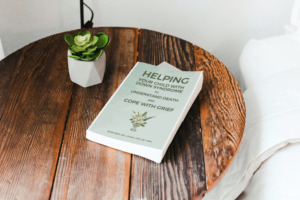Parents raising kids with disabilities are exhausted.
Research supports this, and I see plenty of evidence of it my counseling practice.
I’m a therapist who helps parents raising kids with Autism, Down syndrome, and other disabilities. I frequently talk with my clients about their sleep.
Or, put better, their lack of sleep.
What I’ve learned is that there are some surprising things that may contribute to special needs parents not getting enough sleep. Things beyond the basic sleep hygiene no-no’s that we all have read countless times. It’s way more complicated than too much blue light or caffeine!
Read on for the top 3 sneaky things that keep special needs parents from getting enough sleep.
Using your bedroom as your ‘command and research center’
A few months ago, I met with a client online. I usually see this client in my office, but this week her child was home sick. This is one of the many reasons that parents raising kids with disabilities love online counseling.
But that day, online counseling offered something even more valuable. I gained insight that I would have never gotten had my client come to the office that day.
As our session began, I looked behind my client and saw a table overflowing with books and printed out journal articles and notepads. I made casual conversation as she got settled and asked “Oh, are we in your home office?”
And the client replied “No, this is my bedroom”.
This client had shared with me previously that she had terrible insomnia. I asked if she’d be willing to pull back the camera and let me see more of her room, and she obliged.
As she did, the piles of books, post-it note reminders, and scraps of paper continued to fill the frame. I wasn’t surprised when the mom shared that this was where she did her reading and planning about her child’s rare medical diagnosis.
I asked if the mom had considered that these literal walls of data and information might be to blame, at least in part, for her insomnia. If knowing that she was surrounded by work to be done might be causing her brain to stay active in an environment that was meant to be relaxing.
The mom countered that this wasn’t work, this was how she cared for her child.
Accepting that love can be work, and that it can be exhausting
What following was a powerful conversation about care-giving. The realization that love involves work, and that it’s OK to say out loud that it’s overwhelming.
And exhausting.
My client ultimately agreed to try ridding her room of the books and articles related to her child’s diagnosis.
She stopped keeping notepads stashed around the room to jot down any fleeting ideas she had about new treatments or strategies to try. She made her room a space just for rest again.
And you know what?
She finally got some sleep.
Your child’s sleep
It’s also possible that your child’s poor sleep could be wreaking havoc on yours.
The relationship between the sleep of kids with disabilities and the sleep of their parents is understudied. But a few articles have found some relationships. The findings are probably not very surprising if you have a child with disabilities and difficulty sleeping.
This study found that parents of kids with developmental disabilities were more likely to note how the child’s sleep negatively affected theirs if they also indicated that their child had sleep problems.
This study looked specifically at parents raising kids with Angelman syndrome. Sleep disturbance is common among children with Angelman syndrome. The authors note that “disrupted night-time sleep of the parents in association with the parent’s report of problems with the child’s sleep duration suggest that the parents’ sleep quality is affected by the child/adolescents sleep.”
Here are some suggestions if you know that it’s your child’s poor sleep that’s keeping you from getting the rest you need:
- Check with your child’s physician about any underlying medical needs that may be causing them poor sleep. This might include apnea, reflux, allergies, and other conditions. Consult with your child’s physician about environmental changes that might help. Ask if they recommend any medication changes based on their findings.
- Consider, too, whether there could be a sensory issue inhibiting your child’s sleep. Maybe their mattress gives off a scent that only they can detect. Or perhaps the fan is blowing too forcefully on them.
- Ask your child’s physicians and therapists to collaborate and develop specific sleep hygiene recommendations for your child. Common sleep hygiene recommendations include limiting screen time and liquids before bedtime, regular exercise, consistent bedtime routines, etc.
- Swap nights ‘on’ with your partner or another family member. To accomplish this, some parents will stay in a guest room with earplugs in while the other parent is the ‘on’ parent for the night. Some will even stay at another family member’s home or in a hotel. Do what you can to guarantee yourself at least a few nights of uninterrupted sleep per week.
- Sneak in extra sleep whenever or wherever you can. I’ve known more than one mom who has taken a quick car nap while their child was in preschool, or at the childcare center at their gym or church.
Finish line mentality
Parents raising kids with disabilities are often determined (and convinced) that they shouldn’t spend time or money on themselves. At least, not until their kids’ needs are fully met.
The problem in this logic is that it assumes there’s an end point at which your child will be stable and healthy.
That at that magic time it will suddenly feel OK to spend time or money caring for yourself.
This end point…is a myth.
I call this unhelpful mindset “Finish Line Mentality.”
Here are some examples of ways that this finish line mentality causes parents to put off spending time or money on things that could help them get better sleep:
- Putting off replacing a dilapidated mattress because you’re saving up for your child to spend a few months at a feeding clinic.
- Not meeting with a counselor to address your anxiety because you’d rather spend the money on additional ABA services for your Autistic child.
- Not going to the doctor for that weird pain in your shoulder/leg/chest because you’ve spent too much time away from work attending your child’s therapies.
And let’s be real here.
If you’re not going to the doctor for pain, what else might you be doing to cope with it? Taking over the counter pain meds with added caffeine?
What if you’re not committing to meeting with a counselor to address your own mental health needs? How might you be self-medicating to get through the anxiety? Alcohol, perhaps?
Of course, the awful truth is that these strategies are not healthy or helpful in the long term. And what’s worse is that they can make it even harder for you to get the rest that you desperately need.
Many parents realize that they must overcome this ‘finish line’ mentality. Thankfully, finding balance between meeting their child’s needs and meeting their own is what allows them to finally start getting better sleep.













